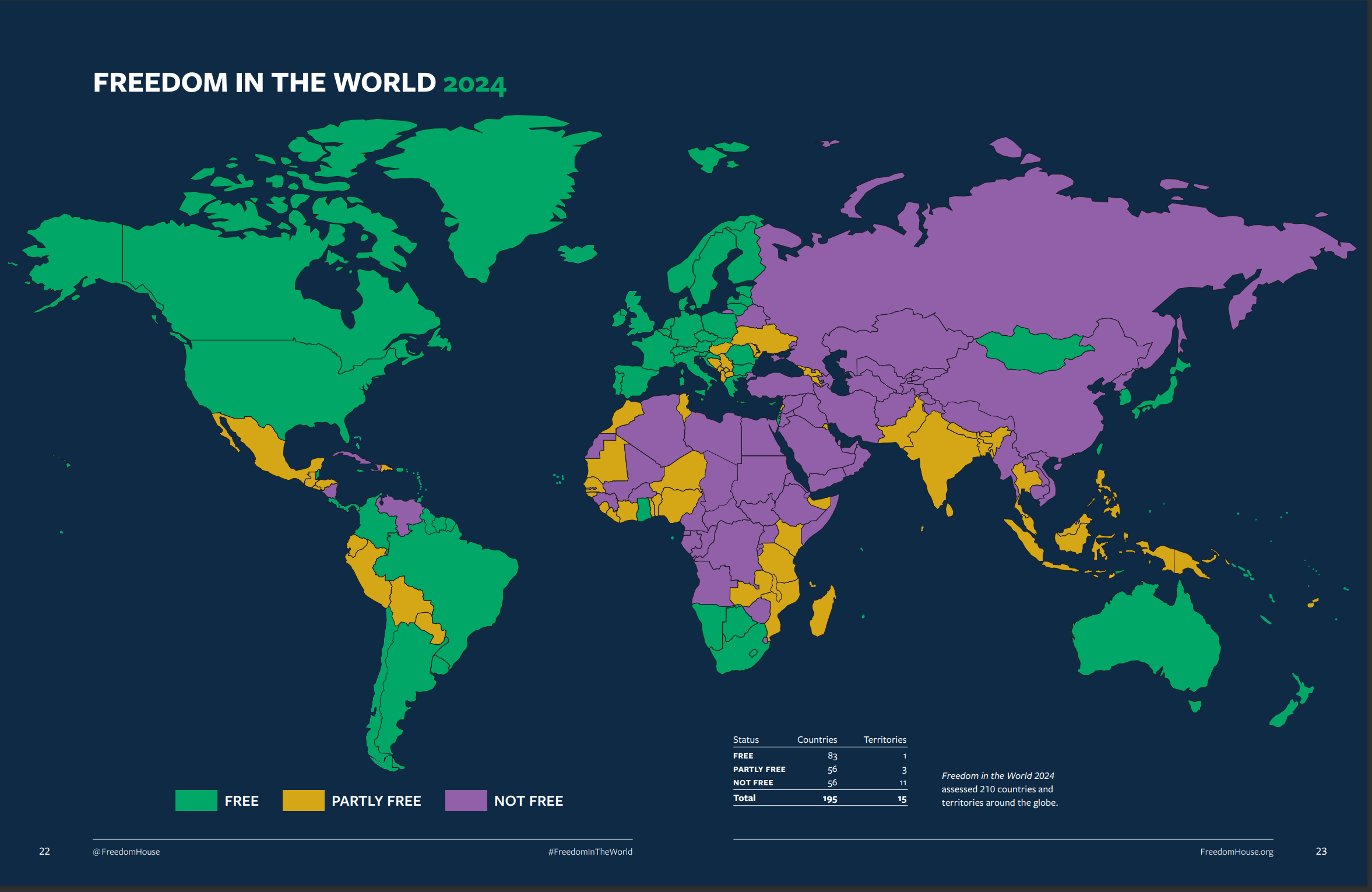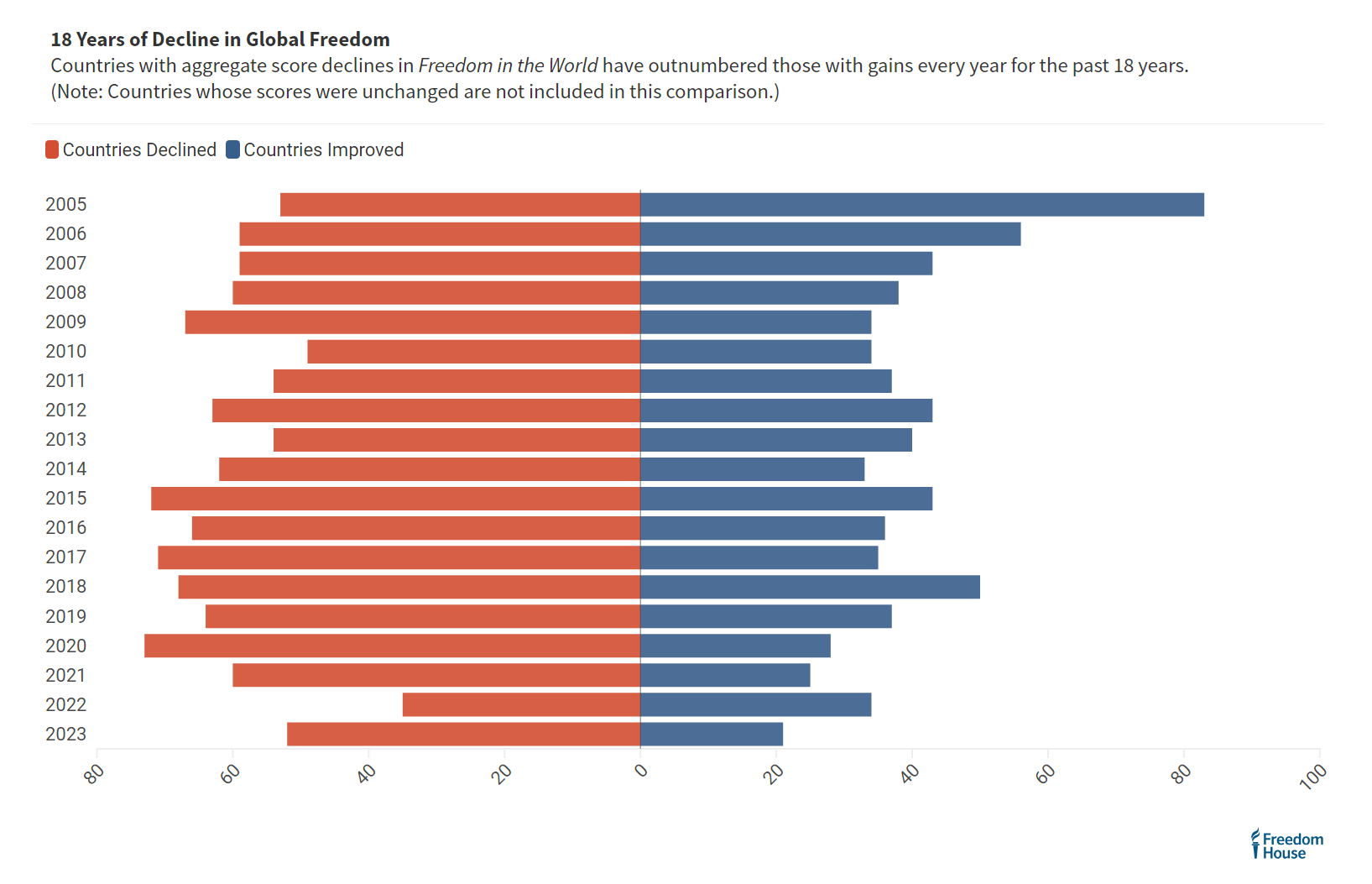Freedom House, a group that watches how free countries are, has just shared its yearly report. This list tells us which countries are free, partly free, or not free at all. It's a big deal for understanding democracy around the world. Sadly, for the 18th year in a row, freedom across the globe has gone down. This year, only 21 countries improved in terms of freedom. That's not many, especially when compared to the 52 countries where things got worse.
The report took a close look at 195 countries and 15 areas to see how much political rights and freedom people have. Even though things have been getting worse for almost 20 years, it's not all bad news. When Freedom House first started this report 51 years ago, things were a lot different. Back then, only 44 out of 148 countries were considered free. Now, 83 out of 195 countries are counted as free. So, there has been some progress over the long term.
This year, a few countries did manage to do better. Thailand, for example, moved up to "partly free" thanks to a more open election. Fiji, Nepal, Liberia, and Mauritania also improved. But, many places saw freedom shrink. In Ecuador, violent groups hurt the election process so much that the country's freedom rating went down. Other countries like Poland, Turkey, Cambodia, Guatemala, and Zimbabwe also faced problems. Leaders in these places made it hard for people to have fair elections last year.
The report highlights that people living in disputed territories often lack access to self-determination, making them vulnerable to rights abuses by unchecked authorities. It cites several territories where autocratic regimes have clamped down on freedoms, including Beijing in Hong Kong and Tibet, and Russia in Crimea amid its war against Ukraine. The report also calls out democratic governments for complications in disputed areas - Israel in the Palestinian West Bank and Gaza Strip, and India in Kashmir. It argues that these issues are intertwined with larger threats to democratic principles within those countries.
This report is a wake-up call. It shows us that even though we've made some progress over the years, there's still a lot of work to do. Freedom isn't guaranteed, and it's something that countries need to work on all the time.
Read next: Research Reveals Humans Misidentify AI Bots 58% of the Time in Online Politics
The report took a close look at 195 countries and 15 areas to see how much political rights and freedom people have. Even though things have been getting worse for almost 20 years, it's not all bad news. When Freedom House first started this report 51 years ago, things were a lot different. Back then, only 44 out of 148 countries were considered free. Now, 83 out of 195 countries are counted as free. So, there has been some progress over the long term.
This year, a few countries did manage to do better. Thailand, for example, moved up to "partly free" thanks to a more open election. Fiji, Nepal, Liberia, and Mauritania also improved. But, many places saw freedom shrink. In Ecuador, violent groups hurt the election process so much that the country's freedom rating went down. Other countries like Poland, Turkey, Cambodia, Guatemala, and Zimbabwe also faced problems. Leaders in these places made it hard for people to have fair elections last year.
The report highlights that people living in disputed territories often lack access to self-determination, making them vulnerable to rights abuses by unchecked authorities. It cites several territories where autocratic regimes have clamped down on freedoms, including Beijing in Hong Kong and Tibet, and Russia in Crimea amid its war against Ukraine. The report also calls out democratic governments for complications in disputed areas - Israel in the Palestinian West Bank and Gaza Strip, and India in Kashmir. It argues that these issues are intertwined with larger threats to democratic principles within those countries.
This report is a wake-up call. It shows us that even though we've made some progress over the years, there's still a lot of work to do. Freedom isn't guaranteed, and it's something that countries need to work on all the time.
Read next: Research Reveals Humans Misidentify AI Bots 58% of the Time in Online Politics


